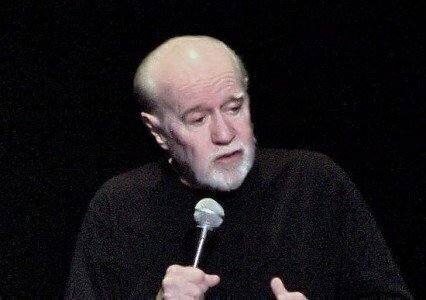On July 3, 1978, the Supreme Court issued its historic verdict in the George Carlin “seven dirty words” case, a decision that still holds sway over the use of indecent and obscene language on television, and in a new era of mass communications.
Carlin himself wasn’t involved directly in the case, which was called Federal Communications Commission V. Pacifica Foundation. He had already won a legal verdict in an unrelated case several years prior to the FCC decision when a judge threw out his arrest in for performing the comedy routine at a Milwaukee summer festival.
It was a New York radio station owned by the Pacifica Foundation that was in hot water with the FCC for playing a recording of Carlin’s “Filthy Words" monologue on October 30, 1973, at 2 p.m. in the afternoon. The broadcast was heard by John H. Douglas, who said he heard the words while driving with his young son in a car. Douglas then complained to the FCC, although the case wasn’t decided until almost five years later. FCC ended in a 5-4 split among the Justices, with Justice John Paul Stevens writing the majority decision.
Prior to the case, the FCC had warned Pacifica that the language in Carlin’s routine was indecent and prohibited by FCC statutes. The FCC didn’t fine Pacifica, but instead issued an order that threatened to take into account any complaints when Pacifica next sought to renew its broadcast license.
The United States Court of Appeals for the District of Columbia Circuit reversed the decision in 1977 by a 2-1 margin, with each judge writing separate opinions. Judge Tamm said that the FCC’s order represented censorship.Chief Judge Bazelon said the FCC’s order “must be narrowly construed to cover only language that is obscene or otherwise unprotected by the First Amendment.”
But Judge Leventhal argued the FCC correctly concluded that the content was indecent because it was broadcast during the daytime and the FCC had a legitimate interest in protecting children from hearing such indecent content.
Despite the humor in Carlin’s monologue, the Court was faced with a very serious question: Did the First Amendment deny the federal government any power to restrict the public broadcast of indecent language under any circumstances?
Justice Stevens agreed with Judge Leventhal from the District of Columbia appeals court.
“We have long recognized that each medium of expression presents special First Amendment problems,” Justice Stevens said. He stated that because “the broadcast media have established a uniquely pervasive presence in the lives of all Americans” and “broadcasting is uniquely accessible to children,” the FCC had the right to impose an order on the radio station warning it about the consequences of the broadcast.
The FCC had the right to treat indecent speech as a nuisance, in this one instance, because the Court said that limited civil sanctions could constitutionally be invoked against a broadcast of words dealing with sex and execration.
Stevens then referenced a Court decision from 1926 and a quote from Justice George Sutherland: "Nuisance may be merely a right thing in the wrong place, - like a pig in the parlor instead of the barnyard."
The decision officially gave the FCC the ability to impose penalties on broadcasters who presented obscene, indecent, or profane language outside of certain time periods or in certain cases. It also limited the First Amendment rights of broadcasters.
Justice William Brennan wrote the dissent. “I find the Court's misapplication of fundamental First Amendment principles so patent, and its attempt to impose its notions of propriety on the whole of the American people so misguided, that I am unable to remain silent.”
“The Court's decision may be seen for what, in the broader perspective, it really is: another of the dominant culture's inevitable efforts to force those groups who do not share its mores to conform to its way of thinking, acting, and speaking,” he added.
In 2012, the Court had a chance to revisit the Pacifica decision when it considered three incidents where the FCC wanted to punish Fox and ABC for what it deemed as offensive content. Justice Anthony Kennedy’s majority decision ruled against the FCC, but for procedural reasons. Kennedy saw no need to revisit the Pacifica decision.
But Justice Ruth Bader Ginsburg, while concurring with Kennedy’s overall opinion, stated her objections to the FCC case ruling. “In my view, the Court’s decision in FCC v. Pacifica Foundation was wrong when it issued. Time, technological advances, and the Commission’s untenable rulings in the cases now before the Court show why Pacifica bears reconsideration,” she said.
As for Carlin, he said in his 2009 autobiography, “FCC vs Pacifica has become a standard case to teach in communications classes and many law schools. I take perverse pride in that. I’m actually a footnote to the judicial history of America.”
Scott Bomboy is editor in chief of the National Constitution Center.








